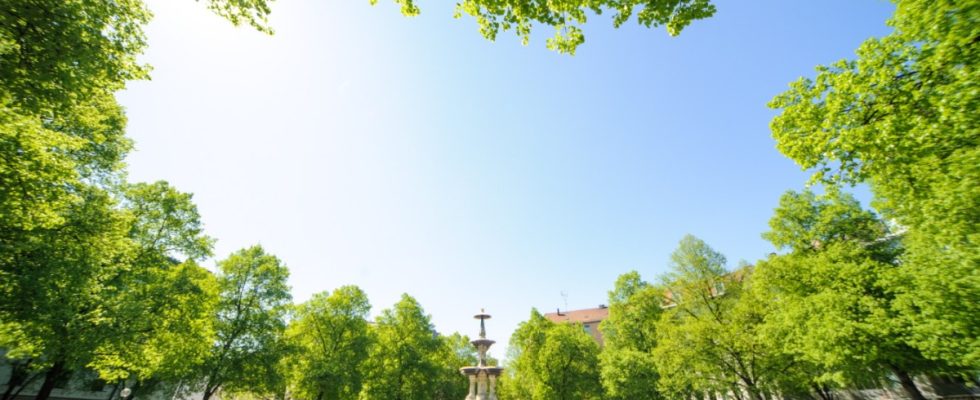Happy Easter! One cannot say that this wish is working particularly well at the moment. The Lord’s arrival must mean a lot to you if you wanted to be “happy” these days. Everywhere you read, hear and see about war, torture, terror and murder. But if someone talks about peace, then he is now considered a senile, old idiot because people now have to be “fit for war”. A word that for a long time was not believed to be popular again one day. At best it sounds like Wilhelm II and the distant past. And then, to make matters worse, “the economy” – whoever that may be exactly – is in a bad mood and doesn’t really want to grow anymore. So you’re supposed to be “happy”?
Wait a minute, what’s going on? Have we now been hit by the typical Munich Grant? About which the Bavarian writer Thomas Grasberger wrote a whole, wonderful book and which he claims is “the blues of the south”? But that wouldn’t even fit up to this point, as the blues, as the music of the black slaves in America, is often melancholic, but only superficially sad. He does have happy moments too, and most of the time there is at least the slightest hint of a better world shining through. Quite an achievement under the conditions of slavery, by the way. With a clever Grant, on the other hand, the complaint that the better world simply doesn’t want to be there predominates. “Luja, sog i!”, to speak with Ludwig Thomas “Munich in heaven”, “zefix Hallelujah!”
So where is the positive? On the way there, it helps enormously if you ignore everything that you can hardly or not at all influence and change through your own intervention. Unfortunately, that’s a lot. But you will quickly see the remaining positive as soon as spring has established itself, and it looks like it could be as early as Easter weekend.
Munich suddenly becomes a completely different city. You can see this most clearly in the places where Munich is the most cliché. Suddenly, in front of the Tambosi on Odeonsplatz, the sunglasses that are on all year round actually fit the faces of the blonde young women with the arrogant expressions and their incredibly cool companions with the carefully groomed three-day beard. By the way, it’s a shame that landlord Pino Crocamo gave up the old seating arrangement a few years ago, where you sat like in a row of cinema seats and could stare at the Feldherrnhalle and the Theatinerkirche. Nowhere else in the city does the sun shine more beautifully and mildly on its population.
What’s nicest, however, is that you can simply stroll past all the important chics. If necessary, you can also cycle, if you accept the Rambos cycling along, who inevitably get far too close to you on the narrow cycle paths and often move at a speed as if they absolutely have to keep up with the souped-up redneck Porsche “on the Leo” , as Leopoldstrasse is called in the casual Munich short form.
On a warm spring or summer evening, there is hardly a more beautiful route than the one from Max-Joseph-Platz in front of the opera up to Giselastraße – and then of course further east to the beer garden at the Chinese Tower – short for: “C-Tower”! – or to the Seehaus and Hirschau. Hordes of people everywhere, sitting in the setting sun (mostly on the eastern side of the street) and relaxing and enjoying cool drinks.
The skaters are at work in front of the State Opera and the Residenztheater. In the English Garden there are actually still a few naked people along the Schwabinger Bach, who of course no longer receive tickets from the police for being naked, as they once did in the 1980s. The Munich economics officer Clemens Baumgärtner (CSU), as the top tourism official, would probably even offer a Nackerten funding bonus today because visitors to the city are expecting this sight that the travel guides tell them about.
Popular meeting place in summer: the meadow below the Monopteros in the English Garden.
(Photo: René Hofmann)
It will also be interesting to see whether the former stoner meadow below the Monopteros will experience a revival from Easter Monday onwards. Disappointing for the Munich police, who needed many years of hard work to clear the meadow of guys who were building their “joints” there with glassy eyes, as it used to be called in technical language.
Apart from smoking weed, making your own can be a key to happiness. During the pandemic, for example, there was apparently nothing going on on Theresienwiese. In fact, people met there for a wide variety of outdoor activities. The city’s sports department invited people to distance-distance pack gymnastics; young people came accompanied by a beer drink. Lonely almond distiller’s huts were a reminder that an Oktoberfest used to take place here, and dogged joggers of both sexes covered as many kilometers in one summer as the amount of steins that are usually emptied here in 16 days. Entire hordes of inline skaters elegantly skated around orange plastic cones on an obstacle course, a folk duo gave a free concert and sang with voices as clear as bells to guitar accompaniment.
Not that you would want Corona back, God forbid! But there was a certain charm to the way people improvised and did something themselves. Nowadays you no longer listen to the street, field, forest and meadow musicians, but go to one of these so-called mega concerts. For example at, exactly: Theresienwiese!, at the European Football Championships with Ed Sheeran and so on. After that, the Theresienwiese will be sealed off again because the Oktoberfest has to be set up.

A stadium is being built for the singer Adele on the exhibition grounds.
(Photo: Live Nation)
And ten times this summer tens of thousands of people can watch Adele’s miraculous increase in money at the exhibition center and probably won’t see much more of her than on YouTube. It’s also interesting that major cultural events now take place on the exhibition grounds, i.e. in a place where it’s all about money and where economic power is measured.
Oops, that almost sounds negative again! But it shouldn’t be, there are so many beautiful events. The spring festival at the end of April, the European Football Championships in June, classical music at Odeonsplatz, and so on. After all, we urgently need everything that promotes well-being. Just to endure all the normal hazards, the signal disruptions and broken down vehicles at MVG, which could long ago be described as the “new normal”. All the large-scale projects that, roughly speaking, take a lifetime to complete, and the much smaller “renovation measures” that easily take a few years.
No grant, please! Just stroll through the streets, enjoy the sun, sit down in a bar – yes, they still exist – and have a cup of coffee or a pint of beer. If you don’t check your emails on your smartphone every five minutes, it can be really relaxing. The Italians know it – another cliché! – under “dolce far niente”.
So the city will have a wonderful summer, provided the weather cooperates. And maybe afterwards it won’t be as dark as we still fear today. Maybe the war in Ukraine will end with Putin being sent home, maybe a solution can still be found in the Middle East. Maybe the brown-blues won’t be the clear election winners here, and over in America the disgusting Trump won’t be president again.
Pious wishes? Might be. Is already allowed at Easter. Markus Söder will probably rightly pull out his “Winter is coming” mug at the end of the year, and the subtext may not be a good one. But perhaps this summer we were able to build up enough confidence to last through the coming winter until next Easter.

